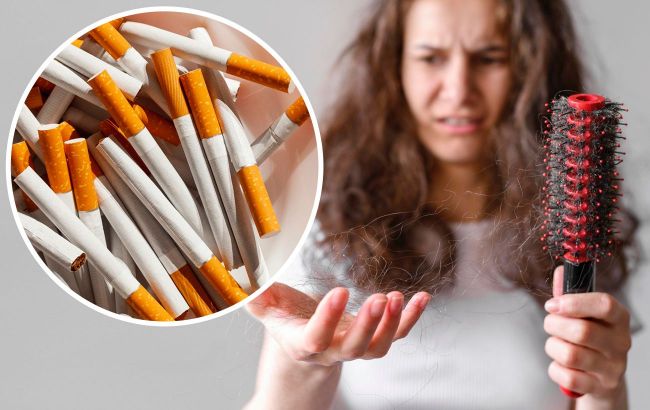How smoking affects hair loss: Explanation from trichologist
 How smoking affects hair loss (collage: RBC-Ukraine)
How smoking affects hair loss (collage: RBC-Ukraine)
Many women in our world have a bad habit - smoking, yet they desire to have healthy-looking hair and skin. For instance, smoking affects hair loss.
More details about this process are provided according to an Instagram post by a Ukrainian trichologist Yulia Sedletska.
How smoking affects hair loss
Certainly, few would have thought that tobacco smoke actually has a strong impact on our hair, and we're not talking about the unpleasant smell of cigarettes that literally gets into the hair and lingers until shampooed.
A trichologist approached this issue from a professional standpoint and found a clear justification for how smoking affects hair loss.
The mechanism of hair damage is directly related to the impact of tobacco smoke on the microcirculatory bed of hair follicles:
- Genotoxic effect on the DNA of hair follicles.
- Increased concentration of pro-inflammatory cytokines.
- Development of perifollicular fibrosis and micro-inflammation, leading to a deficit of active estrogen.

How smoking affects hair loss (Photo: Freepik)
"Did you know that tobacco plants easily absorb and accumulate cadmium in their leaves, which is readily absorbed into the smoker's body after inhaling smoke? This can cause toxic alopecia by disrupting hair shaft formation through covalent bonding with sulfhydryl groups in keratin," says Yulia in her post.
Tobacco smoking is the main source of cadmium exposure to the population as a whole. Absorption of cadmium through the lungs is more efficient than through the gastrointestinal tract. On average, the concentration of cadmium in the blood of smokers is four to five times higher than in non-smokers.
This material is for informational purposes only and should not be used for medical diagnosis or self-treatment. Our goal is to provide readers with accurate information about symptoms, causes, and methods of detecting diseases. RBС-Ukraine is not responsible for any diagnoses that readers may make based on materials from the resource. We do not recommend self-treatment and advise consulting a doctor in case of any health concerns.

